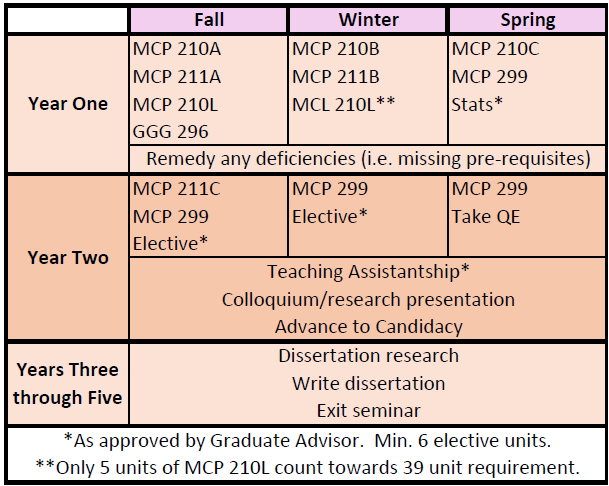Ph.D. Program
The Ph.D. degree is a research degree with specialized education in a particular discipline of physiology.
Students may specialize in the following areas of physiology:
Normally a student will complete course and teaching requirements during the first two years of the program, pass an oral Qualifying Examination given by four faculty members, then conduct and complete the dissertation research under the direction of a major professor, who serves as a research mentor. A dissertation committee approves the dissertation, and the student delivers an exit seminar on this work to the graduate group to complete the degree. Full-time students must enroll in a minimum of 12 units per quarter.
Read the full degree requirements here.
Course Requirements
- Core Course in Physiology (MCP 210 A,B,C; fall, winter, spring, respectively)
- Companion Discussion courses to MCP 210 series (MCP 211A,B,C/298; fall, winter, fall)
- Physiology Laboratory Rotations (MCP 210L; fall, and winter as needed)
- Statistics: One course (4 units), as approved by advisor
- Area of Specialization: two graduate-level courses, equivalent to 6 quarter units, as approved by advisor
- Science Integrity: UC Davis Office of Research Responsible Conduct of Research certificate series or GGG 296 (first year)
Suggested Area of Specialization Courses
Teaching Requirement
All Ph.D. students must serve as teaching assistants (TAs) in one appropriate physiology courses prior to taking the Qualifying Examination.
Qualifying Exam
A qualifying exam is required to determine your competence in physiology as a whole and your chosen area of specialization.
MCIP Graduate Group Research Colloquia
Students are required to present at the Molecular, Cellular and Integrative Physiology Graduate Group Research Colloquia at least once before graduation.
Designated Emphases
Ph.D. students have the option of participating in the Designated Emphasis programs in Biophotonics & Bioimaging, Biotechnology, Reproductive Biology, or Translational Research, Students should decide on participation in their first year, and participants are required to have a faculty representative from their elected Designated Emphasis on their Qualifying Examination committee. Students MUST join DEs prior to taking their QE.
Research and Dissertation
The doctoral dissertation, an original research project in physiology, must be completed under the guidance of a major professor who is a member of the Molecular, Cellular and Integrative Physiology Graduate Group. A dissertation committee composed of the major professor and two or three other faculty members provides guidance and approves the completed dissertation.
Exit Seminar
MCIP students are required to present an Exit Seminar. The Exit Seminar is a formal public presentation of the student’s research before the program faculty and students. The Dissertation Committee will not sign the Dissertation until after the exit seminar has taken place.
Sample PhD Timeline

M.S. Program
The programs for the Master of Science degree are designed to provide in depth training in either Cellular or Systemic Physiology. Full-time students must enroll in a minimum of 12 units per quarter. Students must select either Plan I or Plan II of the M.S. Program as soon as possible:
Plan I: thesis track
Plan II: coursework and comprehensive exam track
Learn more about the differences between Plan I and Plan II in the full degree requirements.
Course Requirements
A minimum of 36 (Plan I) or 39 (Plan II) units in physiology or related subjects is required. Check full degree requirements for more information.
- Core Course in Physiology (MCP 210 A,B,C; fall, winter, spring, respectively)
- Companion Discussion courses to MCP 210 series (MCP 211A,B/298; fall, winter)
- Plan I only: Physiology Laboratory Rotations (MCP 210L; fall)
- Plan I only: Statistics: One course (4 units), as approved by advisor
- Science Integrity: UC Davis Office of Research Responsible Conduct of Research certificate series or GGG 296 (first year)
- Balance of units are to be selected from upper division or graduate courses in physiology or closely related subjects.
- No more than six units can be credited from 290-level courses, i.e., 290/291D/298 (group study), 299 (research)
Plan I Research and Thesis
A research program and thesis must be completed under the guidance of a major professor (a research mentor) who is a member of the graduate group. At least two other faculty members assist the major professor as members of the thesis committee. The M.S. thesis should be a scholarly piece of experimental research that is rigorous in design, methodology and analysis, but is not expected to be as extensive as a Ph.D. dissertation.
Plan II Comprehensive Exam
The Master's Comprehensive Examination is an oral exam conducted by a committee of at least three members. The student will be tested on the physiological concepts taught in the 210 series and be competent to teach basic physiology at the junior college level.
